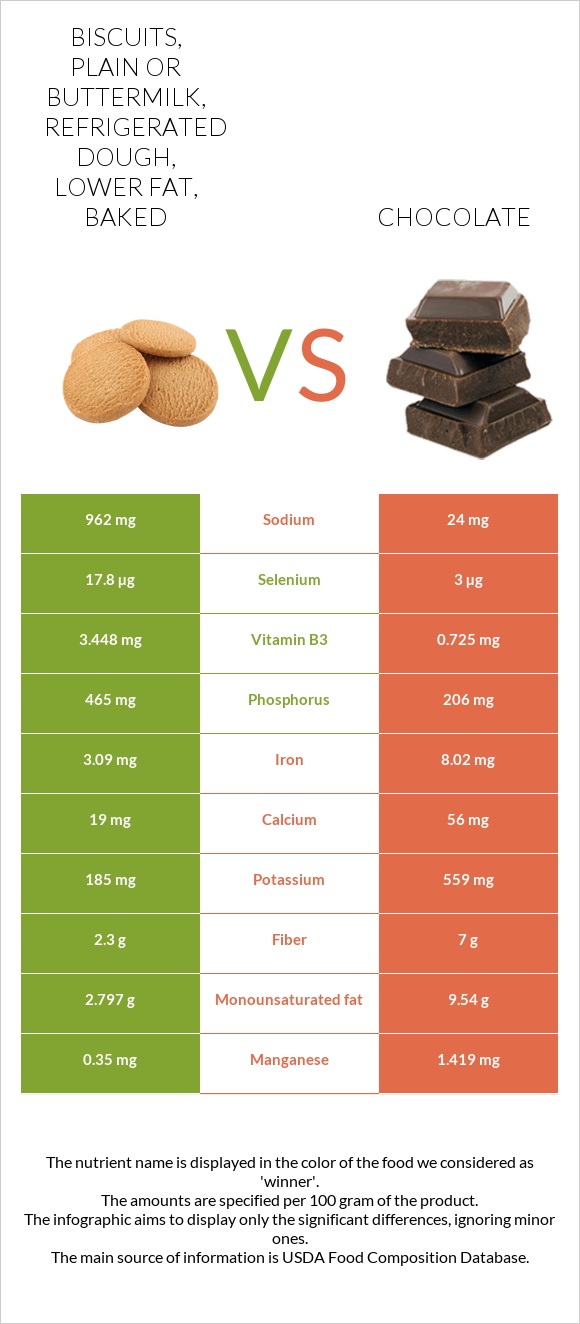Biscuits, plain or buttermilk, refrigerated dough, lower fat, baked vs. Chocolate — In-Depth Nutrition Comparison
Compare
A recap on the differences between biscuits, plain or buttermilk, refrigerated dough, lower fat, baked and chocolate
- Biscuits, plain or buttermilk, refrigerated dough, lower fat, baked has more phosphorus, vitamin B1, and selenium; however, chocolate is higher in copper, iron, manganese, magnesium, and fiber.
- Chocolate covers your daily copper needs 104% more than biscuits, plain or buttermilk, refrigerated dough, lower fat, baked.
- Chocolate contains 40 times less sodium than biscuits, plain or buttermilk, refrigerated dough, lower fat, baked. Biscuits, plain or buttermilk, refrigerated dough, lower fat, baked contains 962mg of sodium, while chocolate contains 24mg.
Food varieties used in this article are Biscuits, plain or buttermilk, refrigerated dough, lower fat, baked and Chocolate, dark, 45- 59% cacao solids.
Infographic

Infographic link
Mineral Comparison
Mineral comparison score is based on the number of minerals by which one or the other food is richer. The "coverage" charts below show how much of the daily needs can be covered by 300 grams of the food.
| Contains more PhosphorusPhosphorus | +125.7% |
| Contains more SeleniumSelenium | +493.3% |
| Contains more MagnesiumMagnesium | +758.8% |
| Contains more CalciumCalcium | +194.7% |
| Contains more PotassiumPotassium | +202.2% |
| Contains more IronIron | +159.5% |
| Contains more CopperCopper | +1017.4% |
| Contains more ZincZinc | +337% |
| Contains less SodiumSodium | -97.5% |
| Contains more ManganeseManganese | +305.4% |
Vitamin Comparison
Vitamin comparison score is based on the number of vitamins by which one or the other food is richer. The "coverage" charts below show how much of the daily needs can be covered by 300 grams of the food.
| Contains more Vitamin B1Vitamin B1 | +1568% |
| Contains more Vitamin B2Vitamin B2 | +364% |
| Contains more Vitamin B3Vitamin B3 | +375.6% |
| Contains more FolateFolate | +∞% |
| Contains more CholineCholine | +∞% |
| Contains more Vitamin AVitamin A | +∞% |
| Contains more Vitamin EVitamin E | +671.4% |
| Contains more Vitamin B6Vitamin B6 | +44.8% |
| Contains more Vitamin B12Vitamin B12 | +∞% |
| Contains more Vitamin KVitamin K | +268.2% |
All nutrients comparison - raw data values
| Nutrient |  |
 |
DV% diff. |
| Copper | 0.092mg | 1.028mg | 104% |
| Saturated fat | 3.648g | 18.519g | 68% |
| Iron | 3.09mg | 8.02mg | 62% |
| Manganese | 0.35mg | 1.419mg | 46% |
| Sodium | 962mg | 24mg | 41% |
| Phosphorus | 465mg | 206mg | 37% |
| Fats | 9.1g | 31.28g | 34% |
| Vitamin B1 | 0.417mg | 0.025mg | 33% |
| Magnesium | 17mg | 146mg | 31% |
| Selenium | 17.8µg | 3µg | 27% |
| Folate | 83µg | 21% | |
| Fiber | 2.3g | 7g | 19% |
| Monounsaturated fat | 2.797g | 9.54g | 17% |
| Vitamin B3 | 3.448mg | 0.725mg | 17% |
| Zinc | 0.46mg | 2.01mg | 14% |
| Vitamin B2 | 0.232mg | 0.05mg | 14% |
| Caffeine | 0mg | 43mg | 11% |
| Calories | 319kcal | 546kcal | 11% |
| Potassium | 185mg | 559mg | 11% |
| Vitamin B12 | 0µg | 0.23µg | 10% |
| Protein | 7.8g | 4.88g | 6% |
| Vitamin K | 2.2µg | 8.1µg | 5% |
| Calcium | 19mg | 56mg | 4% |
| Vitamin E | 0.07mg | 0.54mg | 3% |
| Cholesterol | 0mg | 8mg | 3% |
| Carbs | 51.6g | 61.17g | 3% |
| Polyunsaturated fat | 0.78g | 1.092g | 2% |
| Vitamin B6 | 0.029mg | 0.042mg | 1% |
| Choline | 4.1mg | 1% | |
| Net carbs | 49.3g | 54.17g | N/A |
| Sugar | 8.14g | 47.9g | N/A |
| Vitamin A | 0µg | 2µg | 0% |
| Vitamin B5 | 0.277mg | 0.297mg | 0% |
| Trans fat | 0.112g | N/A | |
| Tryptophan | 0.095mg | 0% | |
| Threonine | 0.211mg | 0% | |
| Isoleucine | 0.269mg | 0% | |
| Leucine | 0.536mg | 0% | |
| Lysine | 0.172mg | 0% | |
| Methionine | 0.138mg | 0% | |
| Phenylalanine | 0.391mg | 0% | |
| Valine | 0.312mg | 0% | |
| Histidine | 0.173mg | 0% | |
| Omega-3 - EPA | 0g | 0.001g | N/A |
| Omega-3 - ALA | 0.085g | N/A | |
| Omega-6 - Eicosadienoic acid | 0.001g | N/A | |
| Omega-6 - Linoleic acid | 0.947g | N/A |
Macronutrient Comparison
Macronutrient breakdown side-by-side comparison
Protein:
7.8 g
Fats:
9.1 g
Carbs:
51.6 g
Water:
27.7 g
Other:
3.8 g
Protein:
4.88 g
Fats:
31.28 g
Carbs:
61.17 g
Water:
0.97 g
Other:
1.7 g
| Contains more ProteinProtein | +59.8% |
| Contains more WaterWater | +2755.7% |
| Contains more OtherOther | +123.5% |
| Contains more FatsFats | +243.7% |
| Contains more CarbsCarbs | +18.5% |
Fat Type Comparison
Fat type breakdown side-by-side comparison
Saturated fat:
Sat. Fat
3.648 g
Monounsaturated fat:
Mono. Fat
2.797 g
Polyunsaturated fat:
Poly. Fat
0.78 g
Saturated fat:
Sat. Fat
18.519 g
Monounsaturated fat:
Mono. Fat
9.54 g
Polyunsaturated fat:
Poly. Fat
1.092 g
| Contains less Sat. FatSaturated fat | -80.3% |
| Contains more Mono. FatMonounsaturated fat | +241.1% |
| Contains more Poly. FatPolyunsaturated fat | +40% |